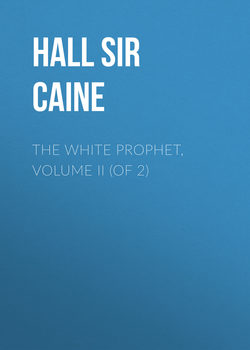Читать книгу The White Prophet, Volume II (of 2) - Hall Sir Caine, Sir Hall Caine - Страница 7
BOOK THREE —Continued
THE LIGHT OF THE WORLD
CHAPTER XVII
ОглавлениеWithin three days the softening effects on the Consul-General of Lady Nuneham's death were lost. Out of his very bereavement and the sense of being left friendless and alone he became a harder and severer man than before. His secretaries were more than ever afraid of him, and his servants trembled as they entered his room.
It heightened his anger against Gordon to believe that by his conduct he had hastened his mother's end. In his absolute self-abasement there were moments when he would have found it easier to forgive Gordon if he had been a prodigal, a wastrel, prompted to do what he had done by the grossest selfishness; but deep down in some obscure depths of the father's heart the worst suffering came of the certainty that his son had been moved by that tragic earnestness which belongs only to the greatest and noblest souls.
Still more hardening and embittering to the Consul-General than the memory of Gordon was the thought of Ishmael. It intensified his anger against the Egyptian to feel that having first by his "visionary mummery," by his "manoeuvring and quackery," robbed him of his son, he had now, by direct consequence, robbed him of his wife also.
All the Consul-General's bull-necked strength, all his force of soul, were roused to fury when he thought of that. He was old and tired and he needed rest, but before he permitted himself to think of retirement, he must crush Ishmael Ameer.
Not that he allowed himself to recognise his vindictiveness. Shutting his eyes to his personal motive, he believed he was thinking of England only. Ishmael was the head-centre of an anarchical conspiracy which was using secret and stealthy weapons that were more deadly than bombs; therefore Ishmael must be put down, he must be trampled into the earth, and his movement must be destroyed.
But how?
Within a few hours after Lady Nuneham's funeral the Grand Cadi came by night, and with many vague accusations against "the Arab innovator," repeated his former warning —
"I tell you again, O Excellency, if you permit that man to go on it will be death to the rule of England in Egypt."
"Then prove what you say – prove it, prove it," cried the Consul-General, raising his impatient voice.
But the suave old Moslem judge either could not or would not do so. Indeed, being a Turkish official, accustomed to quite different procedure, he was at a loss to understand why the Consul-General wanted proof.
"Arrest the offender first and you'll find evidence enough afterwards," he said.
An English statesman could not act on lines like those, so the Consul-General turned back to the despatches of the Sirdar. The last of them – the one received during the dark hours preceding his wife's death – contained significant passages —
"If this man should develop supernatural pretensions I shall know what to do."
Ha! There was hope in that! The charlatan element in Ishmael Ameer might carry him far if only the temptation of popular idolatry were strong enough.
Once let a man deceive himself with the idea that he was divine, nay, once let his followers delude themselves with the notion of his divinity, and a civilised Government would be bound to make short work of him. Whosoever and whatsoever he might be, that man must die!
A sudden cloud passed over the face of the Consul-General as he glanced again at the Sirdar's despatch and saw its references to Christ.
"How senseless everybody is becoming in this world," he thought.
Pontius Pilate! Pshaw! When would religious hypocrisy open its eyes and see that, according to all the laws of civilised states, the Roman Governor had done right? Jesus claimed to be divine, His people were ready to recognise Him as King; and whether His kingdom was of this world or another, what did it matter? If His pretensions had been permitted they would have led to wild, chaotic, shapeless anarchy. Therefore Pilate crucified Jesus, and, scorned though he had been through all the ages, he had done no more than any so-called "Christian" governor would be compelled to do to-day.
"Jesus of Nazareth, the King of the Jews." Why would not people understand that these words were written not in derision but in self-defence? There could be only one authority in Palestine then, and there could be only one authority in Egypt now.
"If this visionary mummer, with his empty quackeries, should develop the idea that he is divine, or even the messenger of divinity, I will hang him like a dog!" thought the Consul-General.
